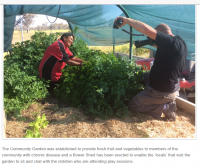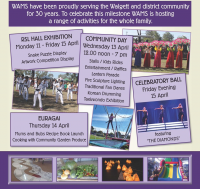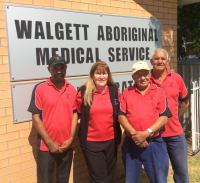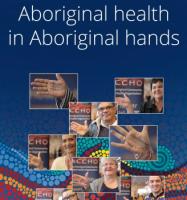An Aboriginal medical service started nearly 30 years ago in a rabidly racist Australian town now has 40% non-Aboriginal patients. The town is Walgett, 650 miles northwest of Sydney, with a present population of about 2,300, about equally Aboriginal and non-Aboriginal. In 1965 Walgett was one of half a dozen country towns that became known nationally and internationally for being visited by university students on a “Freedom Ride” to draw attention to the appalling treatment of Aboriginal people. In Walgett in 1965 Aboriginal people were segregated in the cinema and barred from the RSL club for military veterans, even if they were returned servicemen. Clothing stores would not serve Aboriginal women, arguing that white women would not buy the clothes after Aborigines had tried them on.
The Walgett RSL “was famous for entertaining the Aboriginal troops when they came back from World War II. For one day. The next day the majority of the Aboriginal community were banned for good. They were not allowed in any of the hotels and they had to get their beer and were sold cheap plonk through the back windows at three times the price, through sly-grogging operations,” recalled Charles Perkins, the Aboriginal leader of the protest and the first Aboriginal Australian to graduate from the University of Sydney.
He also recalled how an angry mob of white people quickly dispersed when Aboriginal women pointed out white men having illicit sexual relations with Aboriginal women.
“Suddenly a black woman came out of the crowd, followed by a few other Aboriginal women. They called back to most of the vocal white men: ‘Listen! You whites come down to our camp and chase our young girls around at night! You were down there last night. I know you!’ And she called out some names. ‘I saw you last night! It’s no good tellin’ me how good you treat us Aborigines. All you do is chase Aboriginal women in the dark. Why don’t you go back and tell your wives where you’ve been? They’re over there in the crowd! Go on, tell them.’
“The Aboriginal woman told them off right in front of everybody, yelling at one bloke in particular: ‘You there, you’re nothing but a gin jockey!’* When the Aboriginal woman pointed to a few other white fellows, you should have seen that crowd break up. It was as if someone had thrown a bomb amongst them. She kept on yelling, ‘Yes, and you! And you! You were there a week ago! You have been going with my sister for two years in the dark! What about tellin’ your wife about her? Tell her about the little baby boy you’ve given her!’ The crowd dispersed in minutes as a result of this Aboriginal woman’s revelations, and Walgett would never be the same again.”
A regional hub for wool, wheat and cotton industries, Walgett takes its name from an Aboriginal word meaning 'the meeting place of two rivers'. Like many other remote communities, Walgett has problems with crime linked to the abuse of drugs and alcohol. Many businesses have metal shutters to protect against street crime. The town was officially listed as one of the most socially disadvantaged areas in the state of New South Wales in 2015.
So, not an easy place for an Aboriginal health service to succeed, much less for 40% of its patients to be non-Aboriginal. The Walgett Aboriginal Medical Service (WAMS) was established to serve the Aboriginal community in June 1986 after many years of lobbying. Its first board of directors decided it should treat anyone.
“For all that WAMS has done for the community, they should be applauded and recognition given for its many achievements during the thirty years,” lauded the chairman of the National Aboriginal Community Controlled Health Organisation, Matthew Cooke. Starting with a staff of five, WAMS has grown to more than one hundred (including visiting personnel), making it one of the largest employers in Walgett.
I have sourced what follows from NACCHO Aboriginal Health News Alerts.
They endeavour to support their staff in whatever way they can and offer personal and professional development with training to upskill and fun days to boost morale and comradeship.
WAMS has since added a dental wing (which also has a sound proof room for a hearing program), a children’s mobile service and a community garden, which was acquired during this time as well and transformed from an aged care amenity into a child care facility.
The community garden was established to provide fresh fruit and vegetables to members of the community with chronic disease and a bower shed has been erected to enable the ‘locals’ visiting the garden to sit and chat with children attending play sessions.
The latest addition was a chronic disease building, opened in 2013. WAMS was the first Aboriginal Medical Service in NSW to be accredited (1998) with dual accreditation for organisational operations and general practice accreditation (GPA Plus). This is a major achievement and WAMS recognises the ongoing commitment required to ensure these accreditations continue. The dental clinic achieved full accreditation in 2014 with the support of the Australian Dental Association.
WAMS now has five doctors who care for the community on a daily basis, a regular dentist; many specialist and allied health services have been introduced that Walgett would otherwise not have had access to. Health checks are held annually for children, women, men and the elderly where the majority of health issues are treated on the one day at the one venue.
A recent innovation, the implementation of a Recruitment and Retention Strategy in collaboration with the NSW Aboriginal Health and Medical Research Council has been successful in recruiting Aboriginal people into a range of traineeships at WAMS. The strategy was supported by funding from the Department of Prime Minister and Cabinet. The strategy provides a range of support to Aboriginal people who have no health qualifications to apply for a job and if employed undertake training in a health qualification.
WAMS has for many years provided outreach services to Collarenebri and more recently, Pilliga and Goodooga and have auspiced the Brewarrina Aboriginal Health Service since 2006.
Having partnerships and collegiate working arrangements from local, regional, state and national levels has sustained WAMS operations over the years and in 2013 they became a registered training campus of the Aboriginal Health College.
To attract doctors and visiting personnel to Walgett, WAMS has had to provide clean and comfortable accommodation and private residences were purchased to achieve this. These purchases, along with the purchase of buildings for office space and the construction of new office complexes, has aided Walgett’s economic growth.
Two recent success stories are Eileen Byers and Glenn Sands who were recruited in December 2015 as trainee Aboriginal health workers in Aboriginal and Torres Strait Islander primary health care.
Eileen is from Casino and has taken the courageous step to move to Walgett to work at WAMS. She has left her family and friends to take up this opportunity to study and develop a career for herself in Aboriginal health. Eileen is already a role-model for many people, having being accepted into the Indigenous Marathon Project last year and completing the New York Marathon. Eileen says that leaving her family has been the biggest challenge for her so far in taking up the position at WAMS. “I want to have a career in health and it was important for me and my family that I do this. Everyone at Walgett has been fantastic and I love working at WAMS,” she says.
Glenn was born and raised in Walgett and is a proud Yuwaalaraay/Gamilaraay man. After a variety of jobs, including working as a self employed sole-trader and a member of the NSW Fire & Rescue, he decided to apply for a traineeship at WAMS "because I wanted to help my community.” One of the things he likes about working at WAMS is the training he’s receiving with the opportunity to improve his career path and "reach the peak of my career.” His advice to others in a similar position as himself is: “be proud in what you do".
WAMS will be celebrate the 30th anniversary the week commencing 11 April with an exhibition at the RSL of local artwork, a community day on Wednesday 13 April and a celebratory ball to finish off.
* "Gin" is a demeaning word used by Australian white people to refer to Aboriginal women who were often used for sexual services.
Bookable mobile exhibition Aboriginal Health in Aboriginal hands






Land goes back to Aborigines after 37-year-struggle
http://www.abc.net.au/news/2016-04-06/kenbi-land-claim-resolved-with-han...
Sensitising high school teachers to Aboriginal students' needs
Aboriginal rights activist Ghillar Michael Anderson was born and raised at Brewarrina, near Walgett. As a trained lawyer he worked with the Freedom Ride leader, Charlie Perkins, in a senior government job. He took part in 2014 in a three-day “Connecting to Country” programme in and around Walgett. It was an attempt by the Walgett Aboriginal community to educate staff at the high school about the need to understand where Aboriginal students are coming from psychologically and historically. Hear him and others in a 45-minute video.
Diet the most important factor in chronic disease epidemic
Diet the single most important factor in the chronic disease epidemic facing Aboriginal communities
"For Australia’s Aboriginal and Torres Strait Islander peoples, “diet is the single most important factor in the chronic disease epidemic facing Aboriginal communities.” The resolution commits governments “to reverse the rising trends in overweight and obesity and reduce the burden of diet-related noncommunicable diseases in all age groups.”